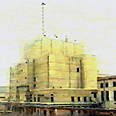
The facilities are in addition to the one at the North's main nuclear site in Yongbyon that was shown to a US expert last month and that had more than 1,000 centrifuges, which officials there reportedly said were operational.
Uranium enrichment could give the North a second source of fissile material for weapons on top of its plutonium production program at the Soviet-era nuclear program at Yongbyon, which was frozen under a now-defunct international disarmament deal.
"The uranium enrichment facility at Yongbyon that the North disclosed to US nuclear expert Siegfried Hecker is not among the three or four South Korea and the US have established to be in existence," the unidentified official was quoted as saying in the Chosun Ilbo newspaper.
"We have established that the uranium enrichment tests that the North has been conducting for some time are at separate locations," the official said.
A South Korean government spokesman declined to comment on the report, which came after Russian Foreign Minister Sergei Lavrov chided North Korea over its nuclear program and condemned an artillery attack on a South Korean island that killed four people last month.
Concern over the scope of North Korea's nuclear program grew after Hecker toured the Yongbyon site in November, where he saw hundreds of centrifuges and was said to have been "stunned" by the sophistication of the program.
Later that month, North Korea launched an artillery barrage against a South Korean island in what it says are disputed waters, triggering concern about a potential conflict that could draw in the United States and China.
Although tension has subsided, Seoul has staged a series of military drills that at one stage involved a US aircraft carrier. On Monday, it launched a new series of live-firing drills at sea, although these are far away from the so-called Northern Limit Line, the maritime boundary between the countries.
North Korea risk on the rise
The shelling and verbal threats from Pyongyang have unsettled financial markets and prompted Seoul to raise its defense spending allocation in its 2011 budget.
Although financial markets have recovered from losses due to the November shelling, South Korea's Finance Ministry warned again on Tuesday that any further incidents could prompt another selloff.
"There is a possibility of heightened geopolitical risks and market instability due to North Korea's isolated armed aggression and change in its leadership," it said.
Some analysts have said that succession moves by North Korean leader Kim Jong-il to groom his youngest son for power is part of the reason for the North's hostile moves against the South.
Although there have not been any more moves by North Korea since the November shelling, it has kept up a steady stream of anti-South Korean rhetoric, blaming Seoul for escalating tension by preparing to begin a war.
North Korea has used its nuclear program to get two deals that were meant to compensate it for ending the program. Officials and experts say the pursuit of nuclear arms is the impoverished state's most effective bargaining chip against outside powers.
Talks aimed at ending the North's nuclear arms program in return for economic aid have been stalled for two years after the North rejected a regime of intrusive inspections.
- Follow Ynetnews on Facebook















